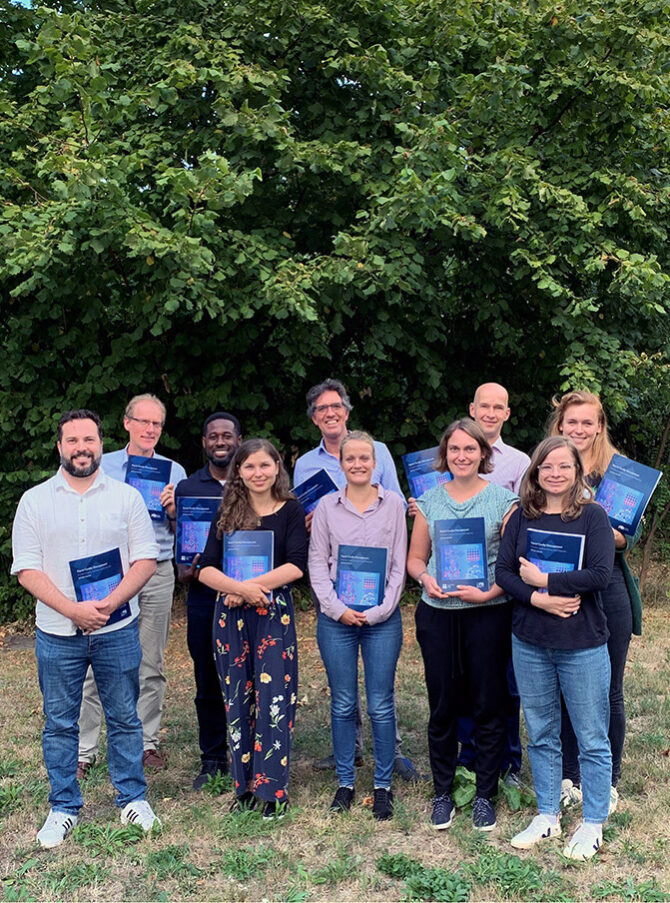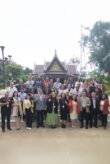The reasons why small and medium-sized enterprises (SMEs) participate in international trade at a low rate are manifold. To mention two major reasons: first, SMEs are more vulnerable to framework conditions such as market developments and high infrastructure costs. And second, SMEs also face greater challenges in complying with product requirements for export. Such requirements comprise standards and technical regulations, as well as sanitary and phytosanitary measures. Navigating and following international market access requirements is time-consuming and costly; compliance costs are often too high for SMEs to bear. Where such enterprises are concerned, exporters in developing and the least developed countries are particularly affected. This was confirmed by Mr. Simon Heisig, Associate Programme Officer at the International Trade Centre (ITC) in Geneva, during a presentation that he gave to PTB staff in August 2022. He said, “Exporters experience obstacles to trade differently. Compliance with technical regulations, conformity to standards and SPS measures are a major challenge for SMEs. The likeliness that SMEs perceive these requirements as burdensome is 20 % higher compared to large enterprises. The agro-food sector is particularly impacted by sanitary and phytosanitary standards and the related certifications and control procedures.”
This is precisely where the seminar concept titled “Export Quality Management” (EQM) comes in. The basis for this concept that was jointly developed by ITC and PTB is the “Guide for Small and Medium-Sized Exporters”. This manual provides all the answers to questions that managers of SMEs may have on export quality management and market access opportunities. It covers technical requirements, product quality, management systems, conformity assessment, metrology, accreditation, and the WTO Agreements on Technical Barriers to Trade, as well as the application of sanitary and phytosanitary measures in detail.
The concept for the seminar itself was developed in cooperation with the consulting company Globally Cool and includes a two-day programme carried out in close cooperation with a local partner. The major target groups are business support organizations that then learn about key market requirement issues. There is also a focus on how to train SMEs about finding the relevant information on technical requirements and using the necessary conformity assessment services. The majority of PTB’s technical cooperation projects operate in the field of sustainable economic development and are aimed at raising awareness of the importance of Quality Infrastructure amongst SMEs.
A range of PTB staff members who coordinate such projects participated in the EQM in-house workshop that was held in Braunschweig from 29-30 August 2022. The programme aimed at generating an awareness and understanding of the EQM concept. A further goal was creating the know-how to conduct effective implementation and to generate sustainable impact amongst business support organizations (BSOs) and SMEs. Instructed by two trainers, the participating project coordinators drafted plans about how to better embed EQM seminars into project activities and how to avoid stand-alone activities. Safeguarding an effective and efficient follow-up with international partners was also discussed along with how EQM is also a tool for BSOs – such as local chambers of commerce – to develop and enhance their services to companies.
Another important topic was the integration of social and labour standards into the seminar programme. Germany’s Act on Corporate Due Diligence in Supply Chains obliges enterprises to ensure due diligence and implement actions if there is an indication of violations against fundamental human rights standards in their supply chains. This additional module for EQM seminars increases the awareness of social standards and focuses on the fundamental ILO conventions and on how SMEs can comply with them. The participants recognized the importance of this optional module. Using the textiles and garments value chain in Uzbekistan as an example meant that the group was able to discuss potential human rights violations and how to monitor them.
After this intensive workshop with its emphasis on gaining knowledge comes the time for action. Three EQM seminars are planned for the next twelve months. Anna Kalkuhl, Project Coordinator at PTB’s Asia Section, is organizing a seminar for December 2022 and has profited from our in-house workshop. She confirmed this by stating, “It was very rewarding to learn how knowledge on export market requirements can make a difference for SMEs in developing countries. I am excited to be organizing a seminar for the Pacific Quality Infrastructure (PQI) Initiative in collaboration with ITC. The regional workshop aims to facilitate a better understanding of market access requirements and will include case studies on agricultural products and food such as coconut.”
Partner organizations interested in hosting a seminar may reach out to one of the project coordinators or get in touch with Christopher Colell, who is the new contact person for cooperating with ITC on the Export Quality Management tool.
Photo © PTB / Verena Stauber








